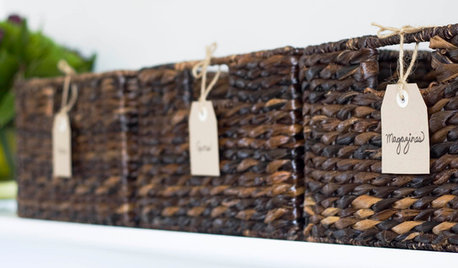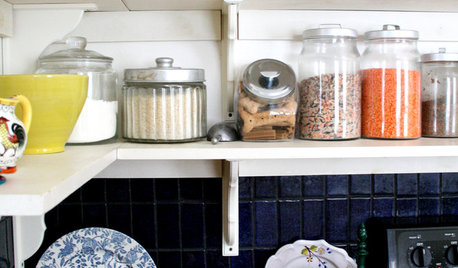Where to get bulk Organic supplies
sequoia851
18 years ago
Related Stories

LIFEYour First-Aid, Emergency and Medical Supply Checklist
Don’t wait until you need them to stock your first-aid kit and emergency stash. Here’s what to get and where to keep it
Full Story
ORGANIZINGGet Organized: Are You a Piler or a Filer?
Tote out the bins and baskets and learn how to be an organized piler if file cabinets leave you cringing
Full Story
LIFE10 Best Ways to Get Organized for a Big Move
Make your next move smooth, short and sweet with these tips for preparing, organizing and packing
Full Story
BATHROOM DESIGNGet It Done: Organize the Bathroom for Well-Earned Bliss
You deserve the dreamy serenity of cleared countertops, neatly arranged drawers and streamlined bathroom storage
Full Story
ORGANIZING7-Day Plan: Get a Spotless, Beautifully Organized Kitchen
Our weeklong plan will help you get your kitchen spick-and-span from top to bottom
Full Story
HOUSEKEEPING7-Day Plan: Get a Spotless, Beautifully Organized Bedroom
Create a sanctuary where you can relax and dream without the nightmare of lurking messes
Full Story
CLOSETSGet Your Broom Closet Just Right
The Hardworking Home: Make cleanup easier with storage space that neatly organizes your equipment and supplies
Full Story
KITCHEN STORAGEGet It Done: How to Clean Out the Pantry
Crumbs, dust bunnies and old cocoa, beware — your pantry time is up
Full Story
KITCHEN DESIGNDisplaying Kitchen Supplies — Hot or Not?
Do some kitchens just beg for a cozy row of canisters and gear for all to see? Have a look and let us know what you think
Full Story
ORGANIZINGGet Up to Speed for Back to School — 12 Tips for Smooth Sailing
New schedules and clothes, paperwork piles ... and where did all the Band-Aids go? These tips will help you ace the new school year
Full Story






Todd_In_Texas
whip1 Zone 5 NE Ohio
Related Professionals
Beachwood Landscape Architects & Landscape Designers · Camas Landscape Architects & Landscape Designers · Forest Acres Landscape Architects & Landscape Designers · Parole Landscape Architects & Landscape Designers · Bellefontaine Neighbors Landscape Contractors · Darien Landscape Contractors · Kearny Landscape Contractors · Lake Saint Louis Landscape Contractors · West Coon Rapids Landscape Contractors · Irvington Landscape Contractors · Clearfield Landscape Contractors · Huber Heights Decks, Patios & Outdoor Enclosures · Kalamazoo Decks, Patios & Outdoor Enclosures · Salisbury Decks, Patios & Outdoor Enclosures · Dent Stone, Pavers & ConcreteLizzieA
janellelee
Todd_In_Texas
mikkle
goo0h
Todd_In_Texas
goo0h
goo0h
Tyrell
robbins
organica
heirloomketchup
hunter_tx
goatclearing
sequoia851Original Author
smallaxe